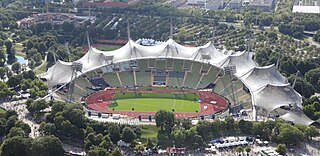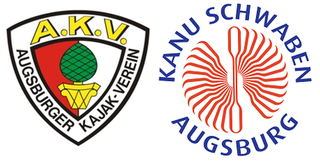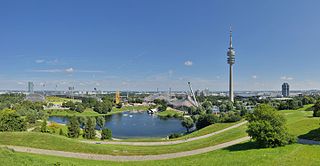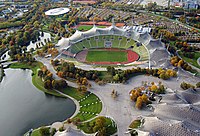
The 1972 Summer Olympics, officially known as the Games of the XX Olympiad and commonly known as Munich 1972, was an international multi-sport event held in Munich, West Germany, from 26 August to 11 September 1972.

Canoe slalom is a competitive sport with the aim to navigate a decked canoe or kayak through a course of hanging downstream or upstream gates on river rapids in the fastest time possible. It is one of the two kayak and canoeing disciplines at the Summer Olympics, and is referred to by the International Olympic Committee (IOC) as Canoe/Kayak Slalom. The other Olympic canoeing discipline is canoe sprint. Wildwater canoeing is a non-Olympic paddlesport.

Olympiastadion is a stadium located in Munich, Germany. Situated at the heart of the Olympiapark München in northern Munich, the stadium was built as the main venue for the 1972 Summer Olympics.

The Augsburg Eiskanal is an artificial whitewater river in Augsburg, Germany, constructed as the canoe slalom venue for the 1972 Summer Olympics in nearby Munich.

The Olympiapark in Munich, Germany, is an Olympic Park which was constructed for the 1972 Summer Olympics. Located in the Oberwiesenfeld neighborhood of Munich, the Park continues to serve as a venue for cultural, social, and religious events, such as events of worship. It includes a contemporary carillon. The Park is administered by Olympiapark München GmbH, a holding company fully owned by the state capital of Munich. The Olympic Park Munich was also considered to be an architectural marvel during the 1972 Olympics in Munich, Germany.

Rosenaustadion is a multi-purpose stadium in Augsburg, Bavaria, Germany. Built in 1951, it is a heritage listed monument and was the largest stadium in Augsburg for 58 years until 2009 when the Augsburg Arena was opened. With a spectator capacity of 32,354, it is primarily used for football matches and track & field athletics events. It is the current home ground for FC Augsburg Women and FC Augsburg II. It is the former home of the FC Augsburg men's first team, who played at the ground between 1951 and 2009.

The 1972 Olympic football tournament, held in Munich, Augsburg, Ingolstadt, Nürnberg, Passau, and Regensburg, was played as part of the 1972 Summer Olympics. The tournament features 16 men's national teams from five continental confederations. The 16 teams are drawn into four groups of four and each group plays a round-robin tournament. At the end of the group stage, the top two teams advanced to the second group stage, where the second-placed teams in each group advanced to the bronze medal match while the first-placed teams advanced to the gold medal match held at Olympic Stadium on 10 September 1972.
At the 1972 Summer Olympics in Munich, seven events in sprint canoe racing were contested, and for the first time at the Olympic Games, four events in slalom canoeing were also contested, at the Augsburg Eiskanal.

The Ocoee Whitewater Center, near Ducktown, Tennessee, United States, was the canoe slalom venue for the 1996 Summer Olympics in Atlanta, and is the only in-river course to be used for Olympic slalom competition. A 1,640 foot stretch of the Upper Ocoee River was narrowed by two-thirds to create the drops and eddies needed for a slalom course. Today, the course is watered only on summer weekends, 34 days a year, for use by guided rafts and private boaters. When the river has water, 24 commercial rafting companies take more than 750 raft passengers through the course each day.

Kanupark Markkleeberg, built in 2006, is the second of two artificial whitewater canoe/kayak slalom courses in Germany, and the only one powered by pumps. The other German course is the Eiskanal in Augsburg, used in the 1972 Summer Olympic Games in Munich. Kanupark Markkleeberg is located on the southeast shore of Markkleeberger See, a lake south of Markkleeberg, a suburb on the south side of Leipzig. A former open-pit coal mine, the lake was flooded in 1999 with groundwater and developed as a water recreation area. The lake is part of the Leipziger Neuseenland, the largest landscape construction project in Europe, which is reclaiming formerly barren industrial and mining sites for recreational use.
The 1985 ICF Canoe Slalom World Championships were held between 12 and 16 June 1985 in Augsburg, West Germany under the auspices of International Canoe Federation for the second time. Augsburg hosted the event previously in 1957. It was the 19th edition. It also marked the first time the championships took place on an artificial whitewater slalom course at the Eiskanal and the first to be held at an Olympic venue. The Eiskanal previously hosted the slalom canoeing events at the 1972 Summer Olympics held in neighboring Munich.
The 2003 ICF Canoe Slalom World Championships were held in Augsburg, Germany under the auspices of International Canoe Federation for the record-tying third time. It was the 28th edition. Augsburg hosted the championships previously in 1957 and 1985 when the city was part of West Germany, and matches the times hosted by Spittal, Austria, Meran, Italy, and Bourg St.-Maurice, France.

Timothy Mark Baillie MBE is a Scottish slalom canoeist who represented Britain. From Westhill in Aberdeenshire, he started competing at the international level in 1996, initially in the K1 category, but switching to C2 in 2003. He retired from the sport in 2013. He is the Olympic Champion in the C2 event from the 2012 Summer Olympics in London.

Etienne Stott MBE is an English slalom canoeist who started competing at the international level in 2002, initially in the K1 category, but switching to C2 in 2005. He retired from the sport in 2016. He is the Olympic Champion in the C2 event from the 2012 Summer Olympics in London.
For the 1972 Winter Olympics in Sapporo, Japan, a total of twelve sports venues were used. A thirteenth venue which was a reserved luge course was constructed, but never used in actual competition. Construction on all of the venues used took place between 1968 and early 1971 in time for the test events. The Tsuskisamu Indoor Skating Rink was not completed until late 1971 or early 1972 because the number of teams scheduled to compete at the 1972 Games was not known. At the actual luge venue used, a malfunctioning starting gate during the first run led to the results being cancelled and rerun being ordered. The results of this event led to the only tie in Olympic luge history. The ski jumps at Miyanomori and Okurayama served as host venues for the FIS Nordic World Ski Championships thirty-five years later.
The 2005 Canoe Slalom World Cup was a series of eight races in 4 canoeing and kayaking categories organized by the International Canoe Federation (ICF). It was the 18th edition. The series consisted of 4 continental championships, 3 world cup races and the world championships.
The 1996 European Canoe Slalom Championships took place in Augsburg, Germany between August 29 and September 1, 1996, under the auspices of the European Canoe Association (ECA). It was the inaugural edition. The races were held on the Eiskanal which also hosted the 1972 Summer Olympics when canoe slalom made its first appearance at the Olympics.
The 2012 European Canoe Slalom Championships took place in Augsburg, Germany between May 9 and 13, 2012 under the auspices of the European Canoe Association (ECA). It was the 13th edition and Augsburg hosted this event for the second time after its inaugural edition in 1996. The races were held on the Eiskanal which also hosted the 1972 Summer Olympics when canoe slalom made its first appearance at the Olympics.
The 2022 ICF Canoe Slalom World Championships took place from 26 to 31 July 2022 in Augsburg, Germany under the auspices of International Canoe Federation (ICF). It was the 42nd edition. The events took place at the Augsburg Eiskanal. Augsburg hosted the championships for the fourth time after previously hosting in 1957, 1985 and 2003.












